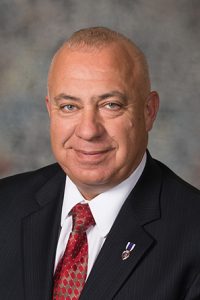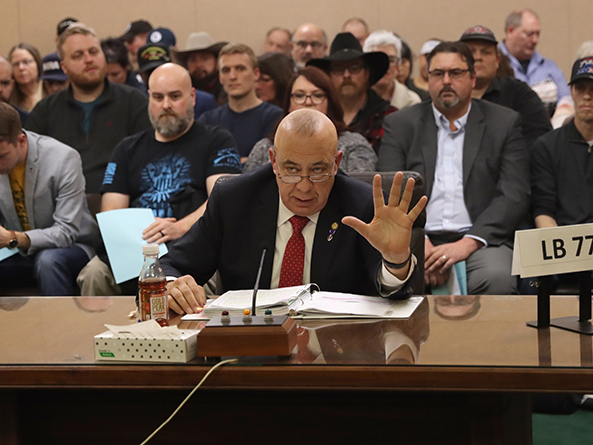Repeal of concealed handgun permit requirement considered
A bill that would remove the requirement for a concealed handgun permit in Nebraska was heard in the Judiciary Committee Jan. 26.

Current state law requires that an individual pass a background check, submit a $100 permit fee and complete a gun safety course to obtain a concealed carry permit. LB77, introduced by Gordon Sen. Tom Brewer, would waive those requirements. An individual not otherwise prohibited from possessing or carrying a gun in Nebraska would be allowed to conceal carry without a permit.
The bill would prohibit counties, cities and villages from regulating ownership, possession and transportation of a concealed handgun.
A similar proposal introduced by Brewer last year stalled on select file, falling two votes short of the number needed to cease debate and force a vote on the bill’s advancement.
Brewer said he brought the measure back, and designated it as his priority bill, because of his belief that the Nebraska Constitution does not allow cities or counties to limit a resident’s right to conceal carry.
With the exception of Colorado, all of Nebraska’s neighboring states allow for “constitutional carry” — a term proponents use to refer to efforts to remove concealed carry restrictions — Brewer said. Additionally, the current training requirements are “one-size-fits all” and may not meet the needs of a particular individual, he said.
“I agree with the fact that training is essential, but it should not be a part of what’s mandatory for a constitutional right,” Brewer said.
Several individuals who spoke in support of the bill said the cost and time it takes to obtain a permit negatively impacts low-income individuals who may desire a gun for self protection, or women who are facing domestic violence or stalking.
Aaron Clements testified in favor of LB77, saying it would return the right to bear arms to the status of an actual right. If one needs a permit to carry a gun, it is a privilege and not a right, he said.
“This bill would make it possible for all Nebraskans to exercise their right, regardless of income,” Clements said. “Constitutional carry would also reduce government bureaucracy and in turn reduce government spending on staffing and licensing agencies.”
Also in support of the bill was Patricia Harrold, president of the Nebraska Firearms Owners Association. The firearm community is supportive of gun training, she said, however the community is not supportive of “forced, bureaucratic and poorly designed” training and education.
Patrick Peterson, speaking on behalf of the Nebraska Freedom Coalition, also spoke in support of the bill. The current permit system requires law-abiding citizens to jump through costly and time-consuming hoops to exercise their constitutional right, Peterson said, which negatively impacts low-income and minority communities who may not have the resources to comply with the requirements.
“The Second Amendment of the U.S. Constitution guarantees the rights of citizens to keep and bear arms,” Peterson said. “This right is not only fundamental to our individual freedoms, but also for the preservation of a free society.”
Michelle Cahn, the Otoe County representative for the Nebraska Firearms Owners Association, also spoke in favor of LB77. Cahn said she has worked with over 50 women whose lives were at risk due to excessive delays and costs associated with the permitting process.
“These women needed training and the ability to carry immediately, but with our current Concealed Handgun Permit Act, they were left defenseless outside their homes and in their cars,” she said.
Those testifying in opposition expressed concern that the bill would result in unintended loopholes, an increase in violent crime and an undermining of law enforcements’ ability to de-escalate dangerous situations.
Omaha Police Chief Todd Schmaderer spoke in opposition to the proposal. In 2022, the Omaha Police Department seized 1,458 firearms — the highest number in department history, he said. Schmaderer expressed concern that LB77, which would remove Omaha’s gun registration ordinance that requires all concealable firearms within city limits to be registered, would allow criminals to conceal carry in a variety of situations.
“[The ordinance] plays a role in how we address violent crime,” Schmaderer said. “The ordinance helps us prevent the mentally ill, substance users, gang members and known criminals from purchasing a firearm. Without the ordinance, there is no way to prevent the carrying of an assault weapon.”
Additionally, Schmaderer expressed concern that LB77 would reverse the current downward trend in the city’s violent crime rate.
Lincoln Police Chief Teresa Ewins also spoke in opposition to the bill, which she said would jeopardize the safety of citizens, those who serve the community and all peace officers in the state.
“Those that obtain a conceal carry weapon permit are taught safe handling of a firearm,” Ewins said. “This is like any skill set — you must learn and practice continuously to become proficient.”
Additionally, Ewins said, the bill as written would approve the concealment of any deadly weapon. The proposal would make public spaces and large gatherings — where mass shootings and terrorism are more likely to happen — less safe, she said.
Christy Abraham spoke against the bill on behalf of the League of Nebraska Municipalities. Local elected officials are in the best position to make decisions for the good of the community, she said, and LB77 would remove a municipalities’ ability to regulate concealed carry laws.
Jayden Speed, representing the Nebraska chapter of Students Demand Action, also spoke in opposition.
“LB77 would allow people to carry hidden, loaded guns in public without a background check or safety training,” he said. “[Additionally, it] would … make it easier for violent criminals to carry guns in crowded towns, town centers and city streets.”
Testifying in a neutral capacity, Douglas County Sheriff Aaron Hanson said he supports the rights of law-abiding citizens to conceal carry, but expressed concern that Omaha no longer would have the tools to prevent individuals from engaging in the reckless and negligent use of firearms.
The committee took no immediate action on the bill.


